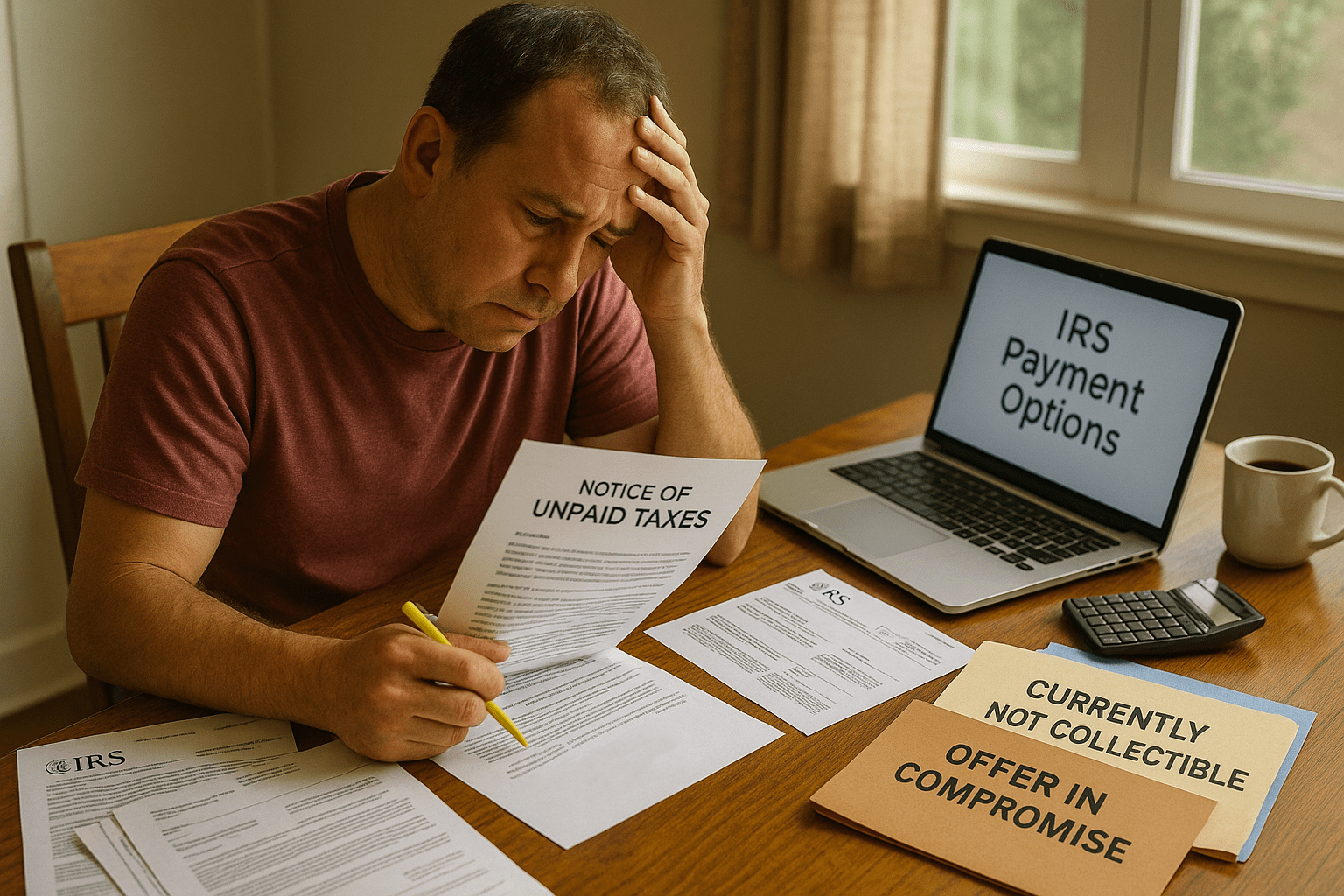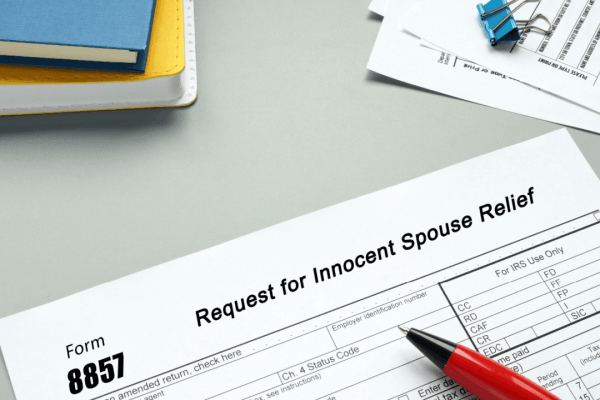
IRS Debt: How to Settle Tax Debt and Reclaim Financial Freedom
Understanding IRS Debt: What It Is and Why It Happens
IRS debt can feel overwhelming, especially if you’re facing penalties, interest, or collection notices. But with the right strategy, it is possible to resolve your tax issues and protect your finances. Every year, many Americans find themselves owing money to the IRS due to missed payments, unfiled returns, or misreported income. While this situation can be stressful, the IRS offers several programs designed to help taxpayers get back on track—if you know where to look and how to qualify.
The most important thing to remember is that ignoring IRS debt never makes it go away. In fact, the longer you wait, the more difficult it becomes to resolve. That’s why early action is critical—whether it means setting up a payment plan or consulting with a tax relief professional. In this guide, we’ll explore how IRS debt happens, what your options are, and how to move forward with confidence.
What Happens When You Owe the IRS?
If you owe money to the IRS, you’re not alone—but the consequences can escalate quickly if you don’t act.
Types of IRS Notices (CP14, CP504, LT11)
The IRS begins communication with a CP14 Notice, which confirms the amount you owe. If the balance remains unpaid, you may receive a CP504, which warns of enforced collections such as wage garnishments or levies. The LT11 or Letter 1058 serves as a final notice before action is taken to seize property or income.
Each letter serves as a warning—and a call to action. Failing to respond can severely limit your resolution options.
Consequences of Ignoring Tax Debt
When IRS debt is left unresolved, penalties and interest can accumulate rapidly. The IRS can:
- Garnish your wages
- Levy your bank account
- Seize your tax refund
- File a federal tax lien against your property
- Restrict your passport for travel
Ignoring these issues may also disqualify you from certain debt relief programs in the future. That’s why it’s critical to explore your options as soon as you receive a notice or realize you can’t pay in full.
Options to Resolve IRS Debt
The IRS offers a variety of solutions for taxpayers who can’t pay their full tax balance right away. Each option is designed to accommodate different financial situations, so the key is understanding which program you qualify for—and how to apply correctly.
Installment Agreements (Monthly Payments)
An Installment Agreement allows you to pay your IRS debt over time in manageable monthly payments. There are several types, including:
- Short-term payment plans for debts under $10,000
- Long-term agreements for higher balances
- Streamlined installment agreements that skip financial disclosure if you owe under a certain threshold
Once accepted, the IRS pauses collection efforts, provided you stick to the agreed payment schedule.
Offer in Compromise (Settle for Less)
The Offer in Compromise (OIC) program lets qualifying taxpayers settle their debt for less than the full amount owed. To be eligible, you must prove:
- You can’t afford to pay the full amount
- The offer reflects your maximum ability to pay
- You’re current with all tax filings
The IRS only accepts a small percentage of OIC applications, so professional help can be essential to getting approved.
Currently Not Collectible (CNC) Status
If you’re in severe financial hardship, you may be granted Currently Not Collectible status. This halts all IRS collection actions, including wage garnishment and bank levies, but does not eliminate the debt. It simply acknowledges that you’re unable to pay at the moment.
While in CNC, penalties and interest continue to accrue, but this option offers temporary breathing room for taxpayers facing extreme financial distress.
Penalty Abatement Programs
The IRS may waive penalties through First-Time Penalty Abatement or Reasonable Cause Relief, especially if you have a good compliance history and a valid explanation for falling behind. Qualifying reasons might include:
- Medical emergencies
- Natural disasters
- Unexpected job loss
Even if you don’t qualify for full penalty relief, partial abatement can significantly reduce your IRS debt burden.
Who Qualifies for IRS Debt Relief Programs?
Not everyone will qualify for every IRS program, but many taxpayers are eligible for at least one form of relief depending on their financial situation. Understanding the requirements, gathering proper documentation, and preparing your case thoroughly is the best way to secure a favorable outcome. If you’re unsure where to start, speaking with a licensed tax professional can help you determine which program you’re most likely to qualify for.
Income Requirements and Hardship Criteria
Programs like OIC and CNC require you to prove financial hardship. The IRS will review your:
- Monthly income
- Living expenses (standardized by region)
- Assets, including real estate, vehicles, and savings
- Overall ability to pay your tax debt
If your income barely covers necessary living expenses, you may be considered a good candidate for settlement or delay.
Supporting Documentation the IRS Will Request
To apply for relief, you’ll typically need:
- Pay stubs or proof of income
- Bank statements
- Rent/mortgage payments and utility bills
- Tax returns for the past two years
Submitting accurate, complete documents increases your credibility and helps avoid delays in processing.
Red Flags That May Disqualify You
You may be denied relief if:
- You haven’t filed all required tax returns
- You’re actively earning high income with no attempt to pay
- You’ve already defaulted on past IRS agreements
- You submit incomplete or inconsistent information
To stay eligible for relief, make sure you are up to date with all filings and be prepared to make a good-faith effort to cooperate.
Should You Hire a Professional to Help With IRS Debt?
While some taxpayers are comfortable handling IRS matters on their own, others find the process confusing, stressful, or time-consuming. Hiring a professional can improve your chances of getting approved for relief and ensure your paperwork is accurate and persuasive.
Role of CPAs, Enrolled Agents, and Tax Attorneys
Three types of professionals are authorized to represent you before the IRS:
- Certified Public Accountants (CPAs): Tax and accounting experts who can review financials and assist with compliance.
- Enrolled Agents (EAs): Licensed by the IRS, EAs specialize in tax resolution and often work directly with tax relief companies.
- Tax Attorneys: Best for complex or high-risk cases, especially those involving audits, fraud allegations, or potential litigation.
Each professional brings a different skillset to the table. The right choice depends on the complexity of your IRS debt situation.
DIY vs. Professional Assistance
You can apply for IRS payment plans and penalty abatement on your own, especially if your case is straightforward. However, professionals provide:
- Assistance with forms and submissions
- Representation in OIC negotiations
- Representation if the IRS initiates enforcement action
- Advice on long-term tax strategy
If you’re dealing with a large tax balance, prior defaults, or have had returns flagged for audit, it’s wise to hire someone experienced in tax resolution.
How to Choose a Legitimate Tax Relief Provider
Unfortunately, the tax relief industry includes many companies that make bold promises and deliver little. To protect yourself, look for:
- Firms with licensed CPAs, EAs, or tax attorneys on staff
- Clear service agreements and transparent fees
- Strong reviews and Better Business Bureau ratings
- No upfront guarantees of IRS approval or “pennies on the dollar” claims
Always verify credentials and don’t hesitate to ask questions about their process and track record. Our network of professionals is built on experience and transparency.
Preventing Future IRS Debt
Once you resolve your IRS debt, the next step is staying on track to avoid falling into the same trap again. IRS debt relief offers a second chance—but keeping it requires consistent effort and smart financial planning. Make sure you’re withholding the correct amount from your paycheck or, if you’re self-employed, paying accurate estimated taxes each quarter. File your returns on time every year, even if you can’t pay in full. Keep organized records and consider working with a tax professional for ongoing support. These proactive steps can significantly reduce your chances of accumulating tax debt in the future.
Withholding Adjustments and Estimated Taxes
If you’re a W-2 employee, check your IRS Form W-4 to ensure the right amount is being withheld from your paycheck. For self-employed individuals and gig workers, it’s important to:
- Calculate estimated taxes quarterly
- Use tools like IRS Form 1040-ES
- Set aside a portion of all income for taxes
Mistakes in withholding or estimated payments are a common cause of IRS debt.
Recordkeeping and Filing on Time
Disorganized records or missed deadlines can result in late filing penalties—even if you owe nothing. Stay on track by:
- Keeping all receipts and expense documentation
- Using bookkeeping software or hiring an accountant
- Filing by the annual deadline, even if you can’t pay in full
Timely filing avoids penalties and shows the IRS you’re trying to stay compliant.
Planning for Self-Employed and Gig Workers
If you’re an independent contractor or freelancer, managing your tax obligations requires extra effort. Consider:
- Setting up a dedicated tax savings account
- Using accounting apps like QuickBooks or FreshBooks
- Consulting with a tax advisor quarterly
Proactive planning is the best way to stay out of IRS debt and reduce stress during tax season.
Regain Control of Your Finances by Tackling IRS Debt Now
Letting IRS debt go unresolved can lead to escalating penalties, wage garnishments, and long-term financial strain. But with the right approach—whether through payment plans, settlement programs, or temporary relief status—you can take back control and move toward a more stable financial future.
The IRS offers several paths for resolving unpaid taxes, and many of them are more accessible than people realize. The key is to act early, stay compliant, and avoid common mistakes that can derail your progress. Whether you choose to handle your case yourself or work with a trusted professional, understanding your options is the first—and most important—step to getting out of tax debt for good.
Get Help Today to Resolve IRS Debt Before It Grows
If you’re struggling with IRS debt, you don’t have to face it alone. Legal Brand Marketing connects individuals with licensed tax professionals who know how to negotiate with the IRS and discuss available relief programs.
Our network includes CPAs, enrolled agents, and tax attorneys who have experience helping people with IRS matters. Whether you need a payment plan, settlement assistance, or guidance on how to respond to a notice, we can match you with a qualified professional.
Take the first step today. The sooner you act, the more options you’ll have to protect your finances and your peace of mind.
Frequently Asked Questions
1. How long can the IRS collect tax debt?
The IRS generally has 10 years from the date of assessment to collect tax debt. This period is known as the Collection Statute Expiration Date (CSED).
2. Can IRS debt be forgiven?
Yes, in limited cases. Programs like Offer in Compromise or Innocent Spouse Relief can reduce or eliminate tax debt, but eligibility depends on your financial circumstances and compliance history.
3. What happens if I ignore IRS debt?
Ignoring IRS debt can lead to penalties, interest, wage garnishment, asset seizure, and tax liens. It can also limit your eligibility for future IRS relief programs.
4. Does the IRS settle tax debt for less than you owe?
Yes, but only under strict conditions. Through the Offer in Compromise program, the IRS may accept less if you prove you can’t afford to pay the full amount.
5. Will IRS debt affect my credit score or loan eligibility?
The IRS doesn’t report tax debt to credit bureaus, but federal tax liens are public records and can impact your ability to qualify for loans, mortgages, or business financing.
Key Takeaways
- IRS debt can be resolved through payment plans, settlement programs, or hardship relief.
- The IRS has multiple tools for collection—don’t wait until enforcement actions begin.
- Relief options require financial documentation and full tax filing compliance.
- Hiring a licensed professional improves your chances of successful resolution.
- Prevent future debt by adjusting your withholding, tracking income, and filing on time.
Free Tax Case Review
If you are struggling with tax debt or have received a letter from the IRS complete the form below.Advertising. This site is a marketing service and does not provide legal or tax advice. Submitting information does not create an attorney-client, tax professional-client, or any other advisory relationship. Results are not guaranteed. A list of participating attorneys, tax firms, and tax providers is available here.
IRS Audit
You received an audit notice from the IRS
Tax Debt Relief
You owe the IRS money and are looking for relief options
Wage Garnishment
The IRS is taking part of your wages to pay off your debt
Tax Lien
The IRS put a legal claim on your property
IRS Property Seizure
The IRS is going to take your property to pay down or pay off your tax debt
Penalty Abatement
You want to request to remove or reduce penalties assessed by IRS
Innocent Spouse Relief
Relief from joint tax debt caused by your spouse or former spouse
Tax Debt FAQ
Common facts, questions and answers about tax debt and tax debt reilef
Tax Debt Lawyer
A tax debt lawyer can help you with your tax debt problems
Recent Posts
- Who Is Eligible for Innocent Spouse Relief and How Does It Work?
- What is an Effective Tax Strategy for Married Couples
- What are the Proofs of Innocent Spouse Relief?
- What Form Do You Use for an Innocent Spouse? | Complete IRS Filing Guide
- What Are the Four Types of Innocent Spouse Relief? | Your Complete Guide



